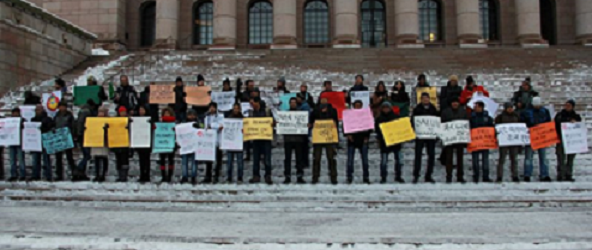The International Crimes Tribunal (ICT) of Bangladesh formed as part of a political campaign promise by the incumbent Awami League Party to try those accused of committing crimes against humanity and other war crimes during the country’s 1970-71 Liberation War. The Court’s procedural standing took shape over the course of 2009-2011, and by January 2012 the court began hearings in the cases of a little over a dozen of the most prominent accused conspirators. Calls for justice swirl amidst accusations of political propagandizing, legitimated assassination by court ruling, and unfair trial practices that lack conformity with international standards. Most recently, events have escalated as a parliamentary amendment to the War Crimes Act allowed for appeal of non-acquitted sentences, allowing for the tribunal to re-evaluate the given life imprisonment sentence of an Islamic leader of the independence movement in favor of the death penalty.
International opinion on the tribunal during its foundational years had been mixed. President Sang-Hyun of the ICC expressed total confidence in Bangladesh’s ability to oversee a domestic war crimes trial, and most countries followed suit with applause, hailing the domestic adjudication of war crimes in Dhaka as an example for countless countries looking to bring similar war criminals to justice and strengthen the power of national courts. U.S. Ambassador-at-Large for War Crimes Stephen Rapp visited Dhaka three times over the course of 2010-2011 to monitor and provide counsel to the proposed court’s procedural and institutional rules. In his last official address on the matter, in November, 2011, he cautioned the court to conform more closely with international standards of procedure, particularly with regard to the standard of “crimes against humanity” and rights of the accused. As to his third address, no reply was heard. His second, in February 2011, had followed only with partial implementation of reforms.
Since November 2011, no US state official or official of an international arbitral body has made a formal statement related to the workings of the court. It seems that once the court began operations under its unique body of procedure, the international community sighed heavily and eased itself into a recliner, content to watch the show unfold. This attitude is disappointing and fails to grasp the potential wider precedential effects the domestic war tribunal will set for similarly situated nations, particularly those in the region. In March 2010 Bangladesh became the first country in the South Asian region to ratify and become a full member of the ICC, a move widely supported by the US and others and one that may have tempered otherwise raucous voices against the domestic tribunal’s credibility. As a member of the ICC, Bangladesh has signaled that it will ensure domestic laws are in compliance with international obligations instantiated in the Rome Statute. With the current ICT, the country veers more towards protecting institutional legitimacy and stability and meting out justice through the rule of law than any other in the region. The decision not to prosecute Pakistani officers identified as war criminals in return for Pakistan’s clemency of Bangladeshi leaders in 1974 shone a light on the interregional possibilities for cooperation and healing inherent in international conflict resolution. In sum, the court provides an example for countries like Sri Lanka and Pakistan, which face similar historical controversies that molded the current political climate.
Structurally, the logistics of promoting rule of law compliance at the national level becomes more articulate and the boundaries more pronounced with every passing country’s take at national prosecution of war crimes. The ICC encourages complementarity-the idea that national courts should handle prosecution of their own nationals, and in Colombia, Uganda, Senegal, Libya, Sierra Leone, East Timor, and soon Syria the day-to-day questions faced in Bangladesh will provide guidance and lessons of best (or least best) practices to future conflict resolution. It is not the level of parallelism the court rises to with ICC standards that matters, more fundamentally it is simply the continuation of and support for the institution’s adjudication that has relevance in other countries where rule of law initiatives still have quite a ways to go. For Bangladesh itself the trial affords an opportunity for acceptance of international standards and future deterrence of actions that rise to the level of war crimes, and its example brings another notch on quasi-international custom’s belt to be debated and rationalized at will. Indeed, the resignation of Chief Judge Huq over allegations of impropriety and collusion with the prosecution confirm the nation’s invested trust and power in the court independent of its politically motivated actors to bring some form of justice, finality, redemption, and closure to events that scarred the country’s development and growth.
The start of the trial should not mean the end of international scrutiny. Procedural and interpretive questions of international law complementarity continue to arise at the court, in response to which the international community should be offering its legal recommendations and counsel. Beyond the passive reports of a select number of journalists bearing witness to the trial, Ambassadors like Rapp should continue to work with Bangladesh in a cooperative manner. The trial will continue with or without international participation and interest, and the aftermath will surely not remain a domestic concern. If the court is skeptical of international interest in a domestic affair, only with time and the build-up of trust will this skepticism abate, and the international community should not shirk away from the task. The cost of silence looms large.
Leslie ESBROOK
Juris Doctor Candidate, Yale Law School 2015
Fulbright Scholar 2010-2012

























































